Akasen chitai / Y˘kihi Blu-ray Movie
HomeAkasen chitai / Y˘kihi Blu-ray Movie 
赤線地帯 / 楊貴妃 | Street of Shame / Princess Yang Kwei-Fei | Masters Of CinemaEureka Entertainment | 1956 | 2 Movies | 178 min | Rated BBFC: 12 | No Release Date
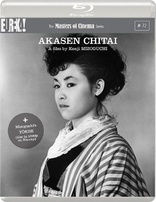
Price
Movie rating
7.6 | / 10 |
Blu-ray rating
| Users | 0.0 | |
| Reviewer | 4.0 | |
| Overall | 4.0 |
Overview
Akasen chitai / Y˘kihi (1956)
The personal tales of various prostitutes who occupy a Japanese brothel.
Starring: Machiko Ky˘, Ayako Wakao, Michiyo KogureDirector: Kenji Mizoguchi
| Foreign | Uncertain |
| Drama | Uncertain |
Specifications
Video
Video codec: MPEG-4 AVC
Video resolution: 1080p
Original aspect ratio: 1.37:1
Audio
Japanese: LPCM Mono (48kHz, 24-bit)
Japanese: LPCM Mono (48kHz, 24-bit)
Subtitles
English
Discs
50GB Blu-ray Disc
Single disc (1 BD)
Playback
Region B (locked)
Review
Rating summary
| Movie | 4.0 | |
| Video | 4.0 | |
| Audio | 4.0 | |
| Extras | 3.5 | |
| Overall | 4.0 |
Akasen chitai / Y˘kihi Blu-ray Movie Review
Reviewed by Dr. Svet Atanasov November 26, 2013Kenji Mizoguchi's final film "Akasen chitai" a.k.a. "Red Line District" (1956) and first color film "Yokihi" a.k.a. "Imperial Concubine Yang" (1955) arrive on Blu-ray courtesy of British distributors Eureka Entertainment. The supplemental features on the disc include an original Japanese teaser for "Yokihi", and video introductions and audio commentary for "Akasen chitai" by critic and filmmaker Tony Rayns. In Japanese, with optional English subtitles for the each film. Region-B "locked".
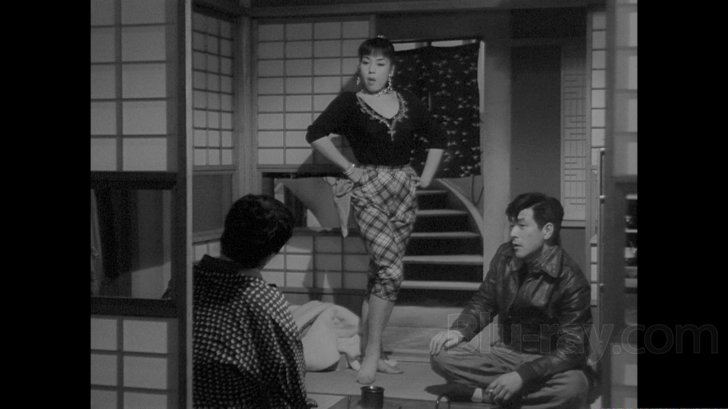
Mickey
Note: Akasen chitai and Yokihi are part of Eureka Entertainment's Late Mizoguchi: Eight Films Blu-ray box set.
Akasen chitai (1956)
Japanese director Kenji Mizoguchiĺs final film, Akasen chitai a.k.a. Red Line District/Street of Shame, follows closely a group of women working in a brothel somewhere in Tokyo. They are of different ages but with similar understandings about the type of work they do.
Appropriately named Dreamland, the brothel has the reputation of a place where for the right amount of money men can buy just about anything. Amongst the regular customers are wealthy businessmen as well as shy husbands with dull jobs. Some have been customers for such a long time that they are convinced that there is a special bond between them and the women.
But the women are only interested in their money. Yasumi (the great beauty Ayako Wakao, Red Angel, Manji) is working hard to make enough to pay off her debts and leave. Yorie (Hiroko Machida, Dancing Girl) is a poor romantic who dreams of saving enough to have a better life with her husband. Hanae (Michiyo Kogure, Drunken Angel) wants to make more to take care of her very sick husband and their baby. Yumeko (Aiko Mimasu, Kisses) works hard and sends most of her money to her grown up son, who is living with her poor grandparents. Mickey (Machiko Kyo, Rashomon), the newest and youngest prostitute, is a rebel who needs money because she refuses to live with her cheating father.
While entertaining their clients, the women are frequently reminded by the owners of Dreamland that the new anti-prostitution bill that is debated in Tokyo could change everything. Despite the troubling news they try to maintain some balance in their lives, but the uncertainty and the slow business eventually complicate their personal and professional relationships.
Akasen chitai is a film with mixed morals. A good part of it clearly condemns the work the women in Dreamland do to support themselves and their families. The rapidly changing facial expressions quickly reveal how deep inside they quietly suffer while hoping that one day they will have enough to rebuild their broken lives.
But there is also a part of this film that suggests that the alternative ľ a male-dominated society in which prostitution is outlawed ľ could be just as bad for the women. Early into the film there is a very powerful sequence in which it is revealed that Hanae and her husband were willing to commit suicide to put an end to their misery, but her job at Dreamland helped them change their minds ľ or at least temporarily.
These somewhat contradicting messages make Akasen chitai a fascinating film to behold. It frequently feels like an Italian neo-realist film, but there is also some of the lightness and playfulness that are so common in the Japanese masterĺs early films.
Structurally, Akasen chitai is also an unusual film. Mizoguchi's beautiful long takes are replaced with more conventional unevenly fragmented sequences. Also, the film is complimented by a minimalistic electronic soundtrack courtesy of Toshiro Mayuzumi (Shohei Imamuraĺs Pigs & Battleships, Mikio Naruseĺs When A Woman Ascends The Stairs).
Yokihi (1955)
Mizoguchiĺs first color film, Yokihi a.k.a. Imperial Concubine Yang, is a period piece based on a Chinese story. It is set in 8th century China where the widowed Emperor Hsuan-tsung (Massayuki Mori, Ugetsu Monogatari, The Bad Sleep Well) spends the majority of his time composing music and thinking about the past. But when the ambitious An Lushan (So Yamamura, Yasujiro Ozu's Tokyo Story, Tora! Tora! Tora!) introduces his distant cousin (Machiko Kyo) to the Court, the Emperor falls madly in love with her and she becomes Princess Yang Kwei-fei.
While the Emperor and the Princess spend time together, the newly promoted General An Lushan uses his influence and stages a revolt. He eventually reaches the Court where the terrified Emperor is presented with a difficult dilemma.
Yokihi is a relaxed and truly beautiful but disappointingly uneven film. During the first half numerous sequences feel unnecessarily protracted - the focus of attention is frequently on trivial events which destabilize the filmĺs rhythm. During the second half precisely the opposite is true - after the Emperor and his concubine warm up to each other, the film suddenly switches gears and introduces different subplots that are resolved in a series of rushed sequences.
The film was lensed by cinematographer Kohei Sugiyama (Teinosuke Kinugasa's Gate of Hell, Mizoguchiĺs The 47 Ronin).
Akasen chitai / Y˘kihi Blu-ray Movie, Video Quality 
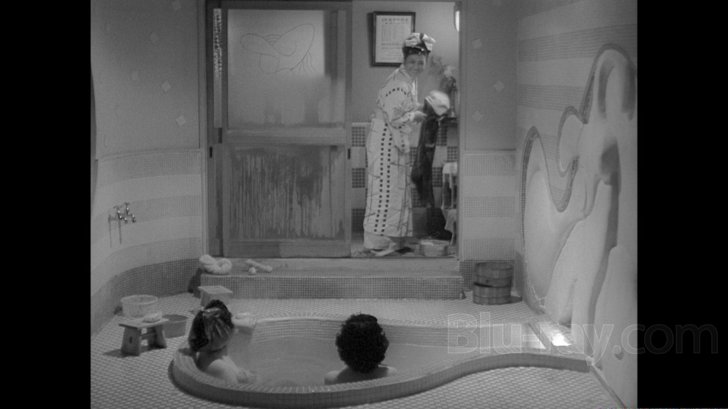
Presented in an aspect ratio of 1.34:1, encoded with MPEG-4 AVC and granted a 1080p transfer, Kenji Mizoguchi's Akasen chitai a.k.a. Red Line District arrives on Blu-ray courtesy of British distributors Eureka Entertainment.
Please note that the screencaptures included with this review appear in the following order:
1. Screencaptures #1-16: Akasen chitai.
2. Screencaptures #17-31: Yokihi.
Definition and image depth are pleasing. Contrast levels are also stable, though a few minor fluctuations are present. The majority of the well-lit footage looks very good, but some of the darker indoor footage is occasionally affected by the presence of a mix of artifacts and extremely light noise (see screencapture #9). However, it appears that there are also source related limitations, such as light fading and unstable frame transitions where definition suffers, which further affect image depth. Fortunately, in motion these areas of the film never look or feel problematic. There are no traces of compromising degraining corrections. Sharpening adjustments also have not been been applied. Finally, there are no large cuts, debris, damage marks, or warps to report in this review. All in all, there is undoubtedly room for improvement, but the current presentation of Akasen chitai will please fans of the film who have previously experienced it only on DVD.
Mizoguchi's first color film, Yokihi a.k.a. Imperial Concubine Yang, is presented in an aspect ratio of 1.33:1, encoded with MPEG-4 AVC and granted a 1080p transfer. The film has a stable organic look, but there are various traces of light color fading around the edges of the frame. I did not find them distracting, but they are there and easy to see. Generally speaking, image depth and clarity are pleasing, while contrast levels remain stable. During select close-ups light blotches and flecks occasionally pop up, but the integrity of the image is not compromised (see screencapture #21) Obviously, these are limitations that have been inherited from the master that was used to produce the high-definition transfer. On the other hand, compression clearly could have been better. There are no traces of problematic degraining corrections. Sharpening adjustments also have not been applied. All in all, the technical presentation is far from perfect, but the film has a stable organic look. (Note: This is a Region-B "locked" Blu-ray release. Therefore, you must have a native Region-B or Region-Free PS3 or SA in order to access its content).
Akasen chitai / Y˘kihi Blu-ray Movie, Audio Quality 
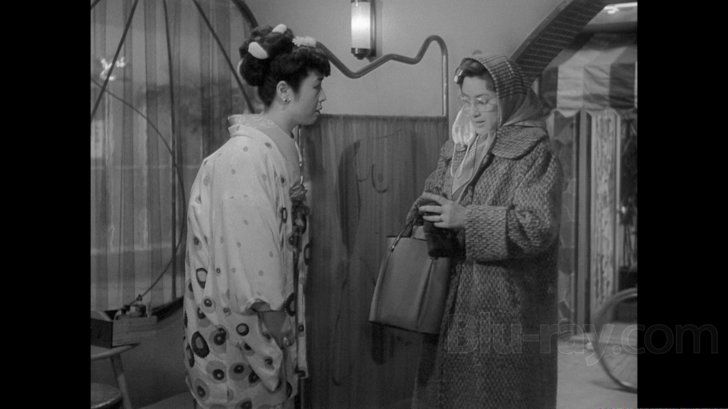
The two films arrive with Japanese LPCM 1.0 tracks. For the record, Eureka Entertainment have provided optional English subtitles for both.
Predictably, dynamic intensity is limited on the two tracks, but these are limitations that can be traced back to the films' original sound designs. On Akasen chitai the dialog is crisp, stable, and free of problematic background hiss. On Yokihi depth and stability are good, but occasionally extremely light background hiss can be felt. During sequences where traditional music is used, balance is good. On Akasen chitai the ultra-modern score sounds great. There are no audio dropouts or distortions to report in this review. The English translation on both films is very good.
Akasen chitai / Y˘kihi Blu-ray Movie, Special Features and Extras 
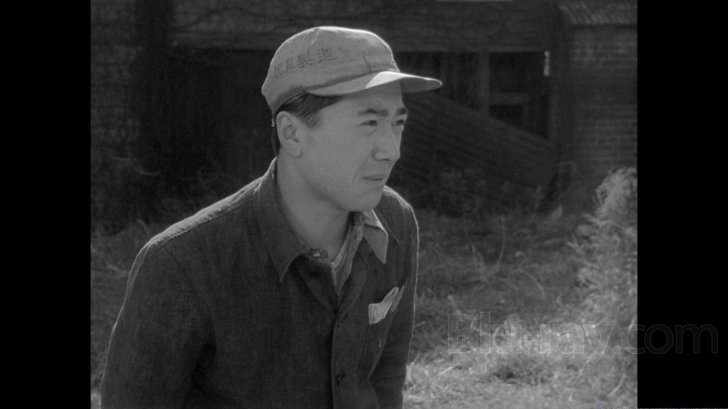
- Tony Rayns on Akasen Chitai - film critic Tony Rayns introduces Kenji Mizoguchi's final film and discusses some of its unique qualities. Mr. Rayns also highlights some important events from the Japanese director's personal life. In English, not subtitled. (12 min).
- Commentary - this audio commentary by film critic Tony Rayns was recorded in January in 2008 in London. It initially appeared on Eureka Entertainment's DVD release of the film.
- Tony Rayns on Yokihi - a second introduction by Tony Rayns to Yokihi, Kenji Mizoguchi's first color film. Mr. Rayns discusses the Chinese story that inspired the film as well as its production history and placement in the Japanese director's body of work. In English, not subtitled. (10 min).
- Original Teaser - original teaser for Yokihi. In Japanese, with optional English subtitles. (2 min).
Akasen chitai / Y˘kihi Blu-ray Movie, Overall Score and Recommendation 
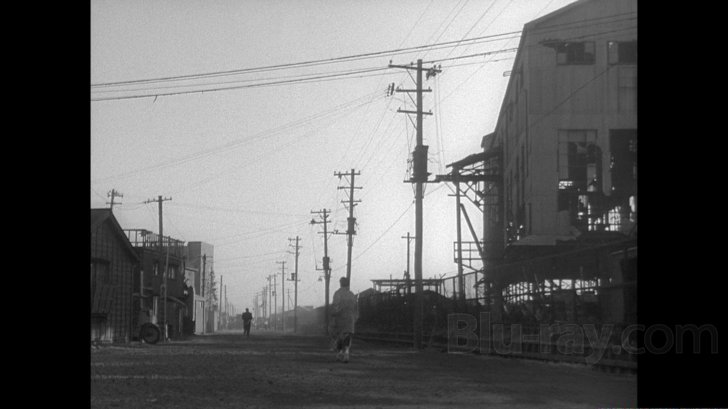
Eureka Entertainment deserve a lot of credit for bringing Kenji Mizoguchi's Akasen Chitai and Yokihi to Blu-ray. Mizoguchi's final film alone would have been a good enough reason to recommend the release. If you have even the slightest interest in classic Japanese cinema, I encourage you to consider adding Eureka Entertainment's beautiful red box set to your collections. HIGHLY RECOMMENDED.
Similar titles
Similar titles you might also like
(Still not reliable for this title)

Sansho the Bailiff
山椒大夫 / Sansh˘ dayű
1954

Sisters of the Gion
Gion no shimai
1936

Osaka Elegy
Naniwa erejţ
1936

Utamaro and His Five Women
Utamaro o meguru gonin no onna
1946

The Insect Woman / Nishi-Ginza Station
にっぽん昆虫記 / 西銀座駅前 | Nippon konchűki / Nishi Ginza ekimae | Masters of Cinema
1963

Profound Desires of the Gods
神々の深き欲望 / Kamigami no Fukaki Yokubo / Masters of Cinema
1968

The Only Son
一人息子 / Hitori musuko
1936

Oyű-sama
1951

Early Summer / What Did the Lady Forget
麦秋 / Bakushū / The Ozu Collection
1951

The Story of the Last Chrysanthemums
Zangiku monogatari
1939

Late Spring
晩春 / Banshun
1949

Like Someone in Love
ライク・サムワン・イン・ラブ / Raiku Samuwan In Rabu
2012

Tokyo Sonata
トウキョウソナタ / T˘ky˘ sonata / Masters of Cinema
2008

Equinox Flower
彼岸花 / Higanbana / The Ozu Collection
1958

Late Autumn / A Mother Should Be Loved
秋日和 / Akibiyori | The Ozu Collection
1960

An Autumn Afternoon
秋刀魚の味 / Sanma no aji | The Ozu Collection
1962

Tokyo Story
Remastered | 東京物語 / T˘ky˘ monogatari
1953

Floating Weeds
浮草 / Ukigusa / Masters of Cinema
1959

Tokyo Decadence
トパーズ / TopÔzu | Standard Edition
1992

Ley Lines
日本黒社会 / Nihon kuroshakai
1999